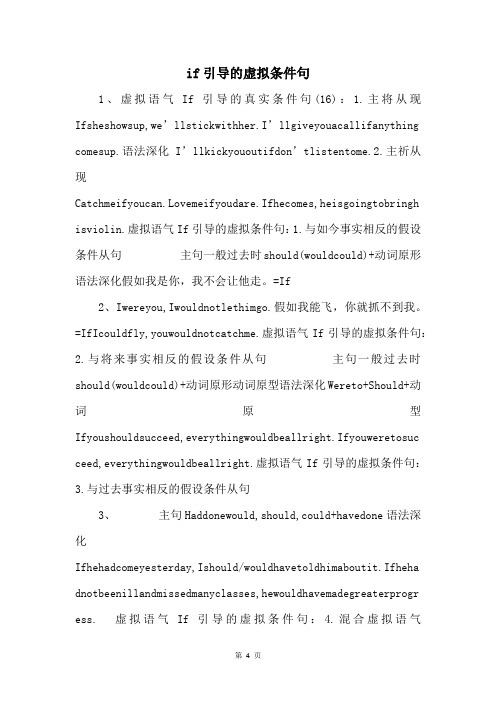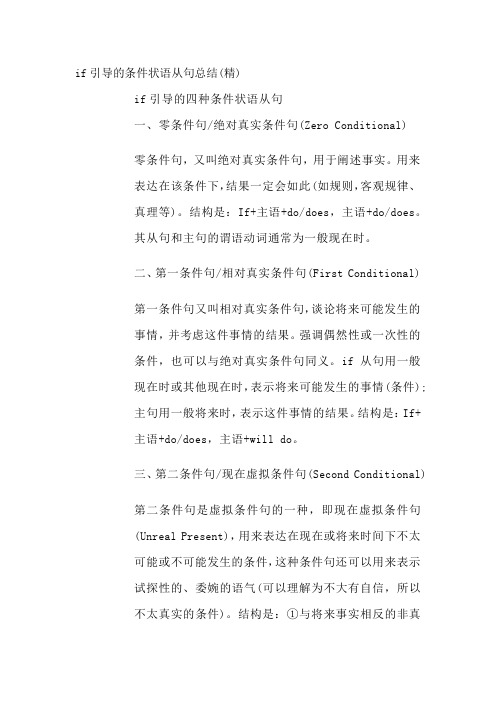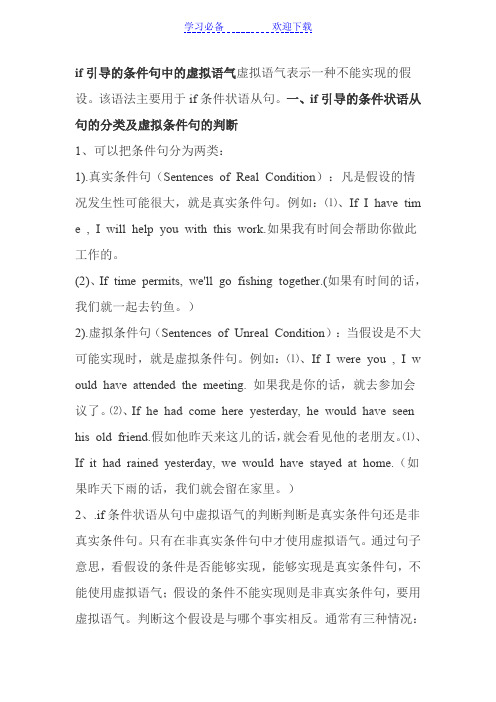if可以引导真实条件句和虚拟条件句
if主从句的三个原则

if主从句的三个原则if主从句是英语语法中一种常见的条件句,也是英语学习中一个重要的语法点。
学习if主从句需要遵循三个原则,下面就来具体解析一下。
第一个原则:真实条件句真实条件句一般表示可能实现的条件,它的主句和从句都采用陈述语气(know,come等)。
例如:如果我有空的话,明天就去看电影。
(If I have time, I will go to see a movie tomorrow.)这句话表示的是,如果我有空的话,我会去看电影。
这个条件存在,我也真的可能会去看电影。
因此,这个条件句应该使用真实条件句。
第二个原则:虚拟条件句虚拟条件句一般表示不可能或不实现的条件。
它分为三种类型:1.虚拟条件句的现在时,它的主句用将来时(will, shall等),从句用一般过去时(were + Ving)。
例如:如果我有钱,我就会买一只荷包蛋。
(If I had money, I would buy an egg.)这句话表示的是,我现在没有钱,所以我不可能买荷包蛋。
因此,这个条件句应该使用虚拟条件句的现在时。
2.虚拟条件句的过去时,它的主句用过去时(was, had, would等),从句用过去完成时(were + Ving)。
例如:如果我当时会开车,我就不会迟到了。
(If I had known how to drive then, I wouldn't have been late.)这句话表示的是,我当时不会开车,所以我迟到了。
因此,这个条件句应该使用虚拟条件句的过去时。
3.虚拟条件句的将来时,它的主句用过去式(would, should等),从句用过去完成时(were + Ving)。
例如:如果你爸爸不忙的话,他就会来的。
(If your father were not busy, he would come.)这句话表示的是,你爸爸现在忙,所以他不可能来。
因此,这个条件句应该使用虚拟条件句的将来时。
if引导的虚拟条件句

if引导的虚拟条件句1、虚拟语气If引导的真实条件句(16):1.主将从现Ifsheshowsup,we’llstickwithher.I’llgiveyouacallifanything comesup.语法深化I’llkickyououtifdon’tlistentome.2.主祈从现Catchmeifyoucan.Lovemeifyoudare.Ifhecomes,heisgoingtobringh isviolin.虚拟语气If引导的虚拟条件句:1.与如今事实相反的假设条件从句主句一般过去时should(wouldcould)+动词原形语法深化假如我是你,我不会让他走。
=If2、Iwereyou,Iwouldnotlethimgo.假如我能飞,你就抓不到我。
=IfIcouldfly,youwouldnotcatchme.虚拟语气If引导的虚拟条件句:2.与将来事实相反的假设条件从句主句一般过去时should(wouldcould)+动词原形动词原型语法深化Wereto+Should+动词原型Ifyoushouldsucceed,everythingwouldbeallright.Ifyouweretosuc ceed,everythingwouldbeallright.虚拟语气If引导的虚拟条件句:3.与过去事实相反的假设条件从句3、主句Haddonewould,should,could+havedone语法深化Ifhehadcomeyesterday,Ishould/wouldhavetoldhimaboutit.Ifheha dnotbeenillandmissedmanyclasses,hewouldhavemadegreaterprogr ess.虚拟语气If引导的虚拟条件句:4.混合虚拟语气Ifyou_______himyesterday,you______whattodonow.(ask,know)语法深化〔从句与过去事实相反,主句与如今事实相反。
if引导的条件状语从句总结(精)

if引导的条件状语从句总结(精)if引导的四种条件状语从句一、零条件句/绝对真实条件句(Zero Conditional)零条件句,又叫绝对真实条件句,用于阐述事实。
用来表达在该条件下,结果一定会如此(如规则,客观规律、真理等)。
结构是:If+主语+do/does,主语+do/does。
其从句和主句的谓语动词通常为一般现在时。
二、第一条件句/相对真实条件句(First Conditional)第一条件句又叫相对真实条件句,谈论将来可能发生的事情,并考虑这件事情的结果。
强调偶然性或一次性的条件,也可以与绝对真实条件句同义。
if从句用一般现在时或其他现在时,表示将来可能发生的事情(条件);主句用一般将来时,表示这件事情的结果。
结构是:If+主语+do/does,主语+will do。
三、第二条件句/现在虚拟条件句(Second Conditional)第二条件句是虚拟条件句的一种,即现在虚拟条件句(Unreal Present),用来表达在现在或将来时间下不太可能或不可能发生的条件,这种条件句还可以用来表示试探性的、委婉的语气(可以理解为不大有自信,所以不太真实的条件)。
结构是:①与将来事实相反的非真实条件句是If+主语+should do/were to do/did,主语+would/should/could/might do;②与现在事实相反的非真实条件句是If+主语+did,主语+would/should/could/might+do。
四、第三条件句/过去虚拟条件句(Third Conditional) 第三条件句是表示与过去事实相反的虚拟语气,是用来表达如果(If)当时那样发生,另外一方面(当时)结果会如何。
通常是指过去的事情,带有一切已经太迟而不能够补救的意思。
结构是:If+主语+had done,主语+would/should/could/ might+have done。
if 条件句的时态搭配1.if从句用一般现在时,主句用一般将来时2.if从句用一般现在时,主句用may/might/canIf the fog gets thicker the plane may/might be diverted.3.if从句用一般现在时,主句用must/shouldIf you want to lose weight you must/should eat less bread.4.if从句用一般现在时,主句用一般现在时5.if从句用现在进行时,主句用一般将来时6.if从句用现在完成时,主句用一般将来时If you have finished dinner I’ll ask the waiter for the bill.。
if引导的条件状语从句和宾语从句

If的用法if 的条件从句分为真实条件从句和虚拟条件从句;真实条件从句:真实条件从句适用于主将从现,是假设有可能发生的;一.位置在if 引导的条件状语从句中,既可以放在主句之前,也可以放在主句之后;若if 条件句放句首,从句后面要加逗号,和主句隔开;You will catch the bus if you get up early. = If you get up early, you will catch the bus.二.时态1.主祈从现主句:一般现在时态包含祈使句和含有情态动词can, may, must等的句子从句:一般现在时态2. 主将从现主句:一般将来时态从句:一般现在时态3.从句:现在进行时,主句:一般将来时If you are looking for Peter you’ll find him upstairs. 如果你是在找彼得,上楼就会找到他;4.if从句用现在完成时,主句用一般将来时If you have finished dinner I’ll ask the waiter for the bill. 如果你吃完了,我就叫服务生来算账5.if 条件句谈论的是重复发生和预示要发生的情景和事件,则主从句大多用一般现在时态;如:If bears are in danger ,they attack people.三.注意事项1.在if 引导的条件状语从句中,当主句是一般将来时态时,不能使用be going to 结构,而要用will.2.在if 引导的条件状语从句中,不能使用some,而要用any.四.同义句转化1.借助于祈使句+and∕or+简单句转化,and表示顺承,or表示转折;例如:1If you work hard, you’ll pass the exam.Work hard, and you’ll pass the exam.2If you do n’t hurry up, you’ll be late.Hurry up, or you’ll be late.2.借助于介词with或者without 来转换例如:If you help me, I’ll finish my job soon.With your help , I’ll finish my job soon.if 条件句不一般,几个要点记心间条件句,放在前,逗号要放句中间;条件句表可能,主句多用将来时;条件句表事实,主句常用现在时;虚拟条件从句:虚拟条件从句是假设不太可能发生的;IF的虚拟语气有三种:内容从句主句与现在事实相反动词过去式be用were would/could/should/might+动原与将来事实相反 should/were to+动原 would/could/should/might+动原与过去事实相反 had+过分 would/could/should/might+ have+过分下面三句依次是上面三种情况的例句:If I were you ,I would/could/should/might do that.If I had know that yesterday, I would/could/should/might have told you .If it should rain , the crops would/could/might be saved.If引导的宾语从句一. if 引导宾语从句时,意思为:是否,从句的时态通常要和主句保持一致;例句 I want to know if he lives there. 我想知道他是否住在那儿; He asked me if I could help him. 他问我是否能帮他;考查点if、whether引导的宾语从句的区别 1. if或whether引导宾语从句时,作“是否”讲,常放在动词ask、see、say、know和find out等后面;一般情况下,两者常可换用,在口语中多用if;例句 Nobody knows whether / if it will rain tomorrow. 没有人知道明天是否下雨; Lucy asked whether / if they had a cotton sweater. 露西问他们是否有棉制的毛衣;二. 注意事项:if或whether引导宾语从句时,要注意三个方面,即连词、语序和时态;1. if或whether既不能和that 或其他连词副词同时使用,也不能省略;例句我不知道他今天是否会来;误 I don’t know that ifwhether he will come here today.正 I don’t know ifwhether he will come here today. 他走过来看看猫是否出了毛病; 误 He came to see what if whether there was anything wrong with his cat .正 He came to see if whether there was anything wrong with his cat .2.if或whether引导宾语从句时,虽具有疑问的意义,但其从句应用陈述句的语序;例句Did you know the way to the hospital The old woman asked me.The old woman asked me if / whether I knew the way to the hospital. 老妇人问我是否知道去医院的路;3.if或whether引导的宾语从句应和主句的时态保持一致;即主句为一般现在时,从句用任一种时态;主句为一般过去时,从句则用过去时中的任一种时态;例句 I don’t know if whether he has come here. 我不知道他是否来过这儿;Tom asked if whether I had read the book. 汤姆问我是否看过这本书; 三.If 和whether两者不能互换的情况1. 只能用whether的情况在动词不定式之前只能用whether:例句 I can’t decide whether to stay. 我不能决定是否留下;2. 在whether …or not 的固定搭配中:例句 I want to know whether it’s good news or not. 我想知道它是不是好消息;3. 在介词后,只能用whether:例句 His father is worried about whether he loses his work.他的父亲担心他是否会失去工作;4.用if会引起歧义时:例句 Could you tell me if you know the answer 这句话有两种意思:“你能告诉我你是否知道答案吗”或“如果你知道答案,请告诉我,好吗”; 如用whether则可避免歧义;考题链接 I don’t know _________ they could pass the exam or not.A. whyB. ifC. thatD. whether答案:D 解题思路:本题考查if与whether的区别,在whether…or not的固定搭配中通常只用whether;练习题:句型转换 1. Do they want fried chicken He asked the boys.改为宾语从句He asked the boys _______they ______fried chicken.2. Was the watch made in Shanghai I don’t know.改为宾语从句I don’t know _______the watch _______made in Shanghai.3. “Do you want to try something new ” Tom’s mother asked him.同义句转换Tom’s mother asked him _____________________to try something new.答案:1. if / whether, wanted 2. if / whether, was 3. if / whether he wanted 一、用所给词的适当形式填空1.If you ________feel tired, you _______________ have to have a rest.3. If there __________be fewer trees, there _______________ be more p ollution.5. If Marcia _____________live alone, she ___________________ keep a p et parrot.6. Lana ________________ buy a new dress if the old one ____________ be out of style.9. Peter _____________ send me a beautiful souvenir if he ___________ _____tour Spain.10. If Mr Green ___________say I am hard- working, my parents ______ ___ feel glad.11.I ____________go to the beach if it________________ not rain this week.13.He ____write a letter to his grandparents if he ____get his repor t card this week.14. If she ____________get up late, she _____________ not catch the early bus.15. Peter ________major in English if he ____pass the exams in Pekin gUniversity.16. 如果努力学习,你就会取得好成绩;If you__________ _________, you ___________ good _____________.17. 他如果看电视太久了,他的父母会不高兴;If he _________ TV too much, his parents __________ __________ u nhappy.18. 如果我们为他组织生日聚会,大家都会来的;Everyone ________________ if we _____________ a birthday party ______ ____ him.19. 如果明天不下雨,我会和你一起去公园的;If it __________ __________ tomorrow, I ______________ go to the park _________ you.21. 如果他有空,他会帮助你的;If he _________________, he _________________ you.23. 你如果抄同学的作业就不能学好各门功课;You _______ _____ good at all the subjects if you ______ the oth er students’homework.Ⅰ单项选择1.If you _____ to the party, yo u’ll have a great time.A. will goB. wentC. goD. going2. It will be a long time ____ Peter _____ his work.A. since, has finishedB. after, finishesC. when, will fin ishD. before, finishes.3. What will father _____ us from JapanA. takeB. bringC. carryD. make4. Weifang is famous ______ kites.A. forB. toC. onD. with5.I ____ her the answer if she ____me.A. can tell, will askB. will tell, will askC. would tell, askD. will tell, asks6. –What are you going to do tomorrow--We’ll go to the library tomorrow if it ___.A. isn’t rainB. rainC. won’t rainD. doesn’t rain7.—Do you know when he will come back tomorrow--Sorry, I don’t know. When he ____ back, I’ll tell you.A. comesB. will comeC. comeD. may come8. What will you do if you _____ to the old folk’s home visitA. goB. wentC. goingD. will go9. If I eat ____ food, I’ll be very fat.A. too manyB. many tooC. too muchD. much too10. I’ll give the book to him if he ___ here next Sunday.A. will comeB. comesC. is comingD. came11. There ____an English film in our school tomorrow.A. is going to haveB. will haveC. is going to beD. h as12. Could you tell us where ____A. will the next Olympic Games heldB. the next Olympic Games will be heldC. would the next Olympic Games be heldD. the next Olympic Games would be held13. When my mother returned last night, I ____ a book.A. readB. am readingC. was readingD. am going to rea d14.What ____ you ____ when it began to rainA. do, doB. were, doingC. are, doingD. did, do15. I’ll wake you up when he ____back.A. willB. is going to comeC. comesD. come1---5 CDBAD6---10 DAACB11---15 CBCBC。
if引导的条件句中的虚拟语气

if引导的条件句中的虚拟语气虚拟语气表示一种不能实现的假设。
该语法主要用于if条件状语从句。
一、if引导的条件状语从句的分类及虚拟条件句的判断1、可以把条件句分为两类:1).真实条件句(Sentences of Real Condition):凡是假设的情况发生性可能很大,就是真实条件句。
例如:⑴、If I have tim e , I will help you with this work.如果我有时间会帮助你做此工作的。
(2)、If time permits, we'll go fishing together.(如果有时间的话,我们就一起去钓鱼。
)2).虚拟条件句(Sentences of Unreal Condition):当假设是不大可能实现时,就是虚拟条件句。
例如:⑴、If I were you , I w ould have attended the meeting. 如果我是你的话,就去参加会议了。
⑵、If he had come here yesterday, he would have seen his old friend.假如他昨天来这儿的话,就会看见他的老朋友。
⑴、If it had rained yesterday, we would have stayed at home.(如果昨天下雨的话,我们就会留在家里。
)2、.if条件状语从句中虚拟语气的判断判断是真实条件句还是非真实条件句。
只有在非真实条件句中才使用虚拟语气。
通过句子意思,看假设的条件是否能够实现,能够实现是真实条件句,不能使用虚拟语气;假设的条件不能实现则是非真实条件句,要用虚拟语气。
判断这个假设是与哪个事实相反。
通常有三种情况:①与过去事实相反。
②与现在事实相反。
③与将来事实可能相反。
3、“后退一步法”后退一步法是指在准确地判断了该句与哪一事实相反后,按虚拟语气的后退一步法处理从句谓语动词的时态。
If条件句

3.与过去事实相反的虚拟条件句 构成 条件状语从句 主句
If + 主语 + 动词过去完成 主语+ would, should, could, might+ have + 式 过去分词
例如 If there had been no air in the tube, the result would have been better.
某英文网站正在开展关于“高一是否该分文理科”的讨论。 请你根据下面所给的要点提示,用英语写一篇短文, 描述目前存在的两种看法,并陈述你的观点,以便向该网 站投稿。 赞成分科的人认为1. 可集中精力学习;2. 减轻学习压力; 3. 学自己喜欢的学科。 反对分科的人认为1. 学科知识受限制;2. 影响个人素质提 高; 3. 对科目缺乏深入了解。你的观点…… 注意:1.词数:120词左右; 2.参考词汇: 素质:quality n. 分科:division n. 全面的:all-round adj. 3. 短文的开头已给出,不计入词数。
I.虚拟语气用在条件状语从句中 虚拟语气用在条件状语从句中,通常从句由连词if 引导。 1.与现在事实相反的虚拟条件句 条件状语从句 If +主语 +动词过去 式(be的过去式用 were) 主句 主语+ would, should, could, might+动词原形
例 If I feared death, I wouldn’t be a Party member. 怕死就不做共产党员。 If there were no air, we couldn’t live. 如果没有空气,我们就不能生活。
if 引导的条件句 if引导的条件句表示在某种条件下,会导致另 一事发生。句式为if从句+ 主句。 中文意思是“如果某事发生(或不发生), 另一事就(不)发生”。通常分以下两种情形: 一、真实条件句 二、虚拟条件句
if引导的条件状语从句的用法
(3)假设
真的,或者有可能成为真的;
(二)假设将来,假设的条
将来
件是将来可能实现的。
1. if 非真实条件句(虚拟)——假设现在
(二)遵循的原则
should do
might+do
例 7 If I _____(be) a bird,I would fly to you right
状态,是正在玩球的意思,
所以此空填 is playing。
3. if 引导的真实条件状语从句——假设将来
例 3 If it _____(rain) tomorrow,we will stay at home.
解析:如果你不想受伤,
就不要玩刀。根据 Don’
t
play with the knife,主句是祈使句,所以从句为 if 引导
to the park.
he will take me to the park,主句用的一般将来时,而且
可以分析出,他哥哥现在还没有回,所以从句为 if 引
导的表将来的条件状语从句。根据“主将从现”的原
则,此空填 comes。
2. if 非真实条件句(虚拟)——假设过去
例8
Years ago if someone_____ (turn) round to
批改学生作文时,遇到拼写错误较多的学生可以这样
及各个时代相关代表作品的赏析,感受中西方文化的
评价:
不同,提高其审美水平;在进行人教版(2014)高中英
neat and tidy!
学生参观学校的科学实验室或者本地的科技馆,感受
1. 认 同 欣 赏:I like your handwriting,which is so
if条件句
if引导的条件状语从句可以分为两类:真实条件句(Sentences of Real Condition)和虚拟条件句。
凡是假设的情况发生性可能很大,就是真实条件句;当假设是不大可能实现时,就是虚拟条件句。
如:If I have time, I will help you with this work. 如果我有时间, 我会帮助你做的。
If time permits, we'll go fishing together. 如果有时间的话,我们就一起去钓鱼。
If I were you , I would have attended the meeting.我要是你的话,就去参加会议了。
If he had come here yesterday, he would have seen his old friend.假如他昨天来这儿的话,就会看见他的老朋友。
if在条件状语从句中的虚拟语气:1.表示与现在事实相反的情况。
其句子结构为:从句:if + 主语+ 动词的过去式(be 用were) + ……主句:主语+ would (should, could , might) + 动词原形+ ……If I were you, I would read it again. 如果我是你的话,我再读一遍。
(事实上我不是你)If he hurried, he could catch the first bus. 他要是快点能够赶上头班公共汽车。
(可他不急)If she knew English, she would not ask me for help. 如果她懂英文,她就不必要我帮了。
2. 表示与过去事实相反的虚拟条件句。
其句子结构为:从句:If + 主语+had +过去完成式动词+ ……主句:主语+ would (should, could, might) + have +过去完成式动词+……If you had taken my advice, you would not have made such a mistake.如果你听了我的劝告,就不会犯这样的错误。
必修2 If真实条件句与虚拟条件句
If真实条件句与虚拟条件句真实条件句与虚拟条件句1.真实条件句真实条件句是指主句中的某一动作或状态是在真实情况下或有可能实现的情形下发生的。
在表示真实条件句的复合句中,表条件的状语从句和表结果的主句的谓语都用陈述语气。
* If you come back late, your mother will worry about you.如果你回来晚了,你妈妈会担心的。
(if引导真实条件句,主句用一般将来时,从句用一般现在时表将来)* If your suggestion is rejected, they will let you know.如果你的建议遭到拒绝,他们会让你知道的。
(if引导真实条件句,主句用一般将来时,从句用一般现在时表将来)2.虚拟条件句(1)虚拟条件句指的是与事实相反或不太可能实现的事。
在表示非真实条件的复合句中,表示条件的状语从句和表示结果的主语的谓语动词要用虚拟语气。
* If I were you, I would focus my attention on looking after my elderly parents.如果我是你,我会把注意力集中在照顾年迈的父母上。
(if引导虚拟条件句,叙述与现在事实相反,主句谓语动词用would do,从句谓语动词用过去式,be用were)* If he had got up a little earier, he wouldn’t have been late. 如果他早一点起床,他就不会迟到了。
(if引导虚拟条件句,叙述与过去事实相反,主句用谓语动词would have done,从句谓语动词用had done)* If he should come(were to come/came)tomorrow, I would treat him to dinner.如果他明天来,我就请他吃饭。
(if引导虚拟条件句,叙述与将来事实相反,主句谓语动词用would do,从句谓语动词有三种形式:shoulddo, were to do, 过去式)当条件状语从句表示的动作与主句表示的动作发生的时间不一致时,动词的形式要根据它所表示的时间来调整,这种虚拟条件句称之为错综复杂虚拟条件句。
If条件句和虚拟语气
If条件句和虚拟语气
If条件句和虚拟语气
条件句是包含条件从句的句子。
条件句分为真实条件句和非真实条件句。
真实条件句表示假设的情况有可能发生,可以用if和unless引导。
例如,如果需要,我会借给XXX。
如果他有时间,他会来的。
如果他在12点之前不来,我们就不会等他了。
除此之外,if还可以表示命令、建议或请求,这时相当于when。
例如,如果她打电话了,请通知我。
如果你见到XXX,请代我问候他。
在真实条件句中,will用于if从句中,不表示将来,而表示愿意或坚持的意思。
例如,如果你愿意走这条路,我会带你去经理办公室。
如果你每晚都喝醉酒,感到不适也就不足为奇了。
非真实条件句包括虚拟条件句和错综时间条件句。
虚拟条件句分为三类,分别与现在、过去和将来有关,且都表示事实相反。
其结构如下:
1.与现在事实相反:If+主语+动词的一般过去,主语
+would/could/might时(be动词一般用were)+动词原形。
2.与过去事实相反:If+主语+had+过去分词,主语+XXX
过去分词。
3.与将来事实相反:If+主语+一般过去时,主语+XXX动
词原形。
如果主语是were,则可以用虚拟语气来表示。
例如,如果我有更多的钱,我会去旅行。
在虚拟条件句中,条件从句的结果用主句来表示。
错综时间条件句则比较复杂,不在本文讨论范围内。
- 1、下载文档前请自行甄别文档内容的完整性,平台不提供额外的编辑、内容补充、找答案等附加服务。
- 2、"仅部分预览"的文档,不可在线预览部分如存在完整性等问题,可反馈申请退款(可完整预览的文档不适用该条件!)。
- 3、如文档侵犯您的权益,请联系客服反馈,我们会尽快为您处理(人工客服工作时间:9:00-18:30)。
Unit 4
一. if 条件句
if可以引导真实条件句和虚拟条件句。
真实条件句表示在假设的条件下,能够实现的情况。
在这种情况下,主句和从句的谓语动语随各自的人称和时态发生变化,同时if条件句遵循“主将从现”的原则,即主句用一般将来时,从句用一般现在时表将来。
If it doesn’t rain tomorrow, we will go for a picnic. 如果明天不下雨,我们去野餐。
如果if条件句用来描述说话人认为与事实相反的内容,或仅是一种愿望,假设、猜测等,我们称为虚拟条件句。
If I got rich , I would travel around the world. 如果我有钱了,我将周游全世界。
1. —I often get nervous when I have an English class. What should I do?
—If I were you, I . (ask the English teacher for help)
2. —What would the earth be like if there ?(is
no air or water on it)
—It could be like the moon without any living things.
3. If it ,the crops would be saved. (is to rain tomorrow)
4. If we had found him earlier, we .(solve the problem more easily)
5. If I hadn’t been so busy, I .(take part in the party)
四、单选。
( )1. If my father here now, he tell me what to do.
A. were, would
B. were, will
C. is would
D. is will
( )2. If I a bee, I work much harder.
A. were, would
B. were, shall
C. had, will
D. have, should
( )3. If I much money, I buy a house.
A. have, will
B. had, would
C. had, will
D. have, should
( )4. He learn more quickly if he harder.
A. will, work
B. would , worked
C. would, work
D. will, worked
( )5. If I you, I do that.
A. was, wouldn’t were, wouldn’t C. am, won’t D. were, won’t
( )6. It’s quite impossible that it will rain tomorrow. But if it ,I would still go to the park.
A. should rains
B. would rain
C. rained
D. had rained
五、汉泽英
1. 如果我是你,我会帮助她。
If I you, I her.
2. 如果我以前去过那个地方,我就认识路了。
(和相反)
If I to the place before, I the way.
3. 万一你明天迟到了,我们就不等你了。
(和相反)
If you tomorrow, we for you.=If you late tomorrow, we for you.
4. 如果没有空气,地球上就不存在生物。
If there no air, there no living things.。
